By: Tiffany D. Johnson
Impunity Watch News Staff Writer
THE HAGUE, The Netherlands – The International Criminal Court (ICC) has taken bold steps towards addressing alleged war crimes in Ukraine. It first dispatched a 42-member team for a comprehensive investigation in 2022. This move was particularly noteworthy considering Ukraine’s status as a non-member state of the ICC.
 |
The ICC also filed charges against Russian President Vladimir Putin and Russian bureaucrat, Maria Lvova-Belova, for the unlawful deportation and transfer of Ukrainian children from occupied areas of Ukraine to the Russian Federation, in violation of Article 8(2)(a)(vii) and Article 8(2)(b)(viii) of the Rome Statute. Most recently, ICC established of a country office in Ukraine in March of last year, marking a pivotal moment in the Court’s engagement with non-member states.
Despite Ukraine’s status as a non-party to the Rome Statute, under Article 12(3) of the Statute, it has twice exercised its prerogatives to accept the jurisdiction of the Court over alleged crimes under the Rome Statute that have allegedly occurred on its territory. In its initial declaration, the Ukrainian government acknowledged the International Criminal Court’s jurisdiction over crimes allegedly committed on its territory between November 21, 2013, and February 22, 2014. The second declaration expanded this period indefinitely to include ongoing accusations of crimes committed across the entirety of Ukraine starting on February 20, 2014. The ICC’s decision underscores its commitment to fostering cooperation and addressing alleged human rights abuses even in the absence of formal membership.
The establishment of a country office signifies a strategic effort by the ICC to enhance its presence on the ground, facilitating direct collaboration with local authorities, civil society, and other stakeholders. This development reflects the ICC’s dedication to transcending geopolitical boundaries and ensuring the pursuit of justice is not confined by legal technicalities.
The ICC’s mandate is primarily rooted in the Rome Statute, an international treaty that governs the Court’s jurisdiction over the most serious crimes of international concern. Early February 2023, the ICC Prosecutor submitted applications to Pre-Trial Chamber II of the International Criminal Court for warrants of arrest in violation of Article 8(2)(a)(vii) and Article 8(2)(b)(viii) of the Rome Statute. To be classed as crimes against humanity, attacks must be part of what the ICC’s founding treaty, the Rome Statute, calls “a widespread or systematic attack directed against any civilian population”. While Ukraine is not a party to the Rome Statute, the ICC can exercise jurisdiction under specific circumstances, such as when the alleged crimes were committed on the territory of a state that is a party to the Statute or when the United Nations Security Council refers a situation to the ICC.
The decision to investigate a non-member state raises important legal and diplomatic questions. It underscores the ICC’s willingness to address alleged crimes even in the absence of formal membership, emphasizing the Court’s role as a global arbiter of justice. However, it also brings to the forefront the delicate balance between the ICC’s pursuit of justice and the principles of state sovereignty.
The ICC’s actions in Ukraine may set a precedent for future cases involving non-member states, encouraging a collaborative approach to address impunity and hold perpetrators accountable. On the contrary, the ICC must navigate potential diplomatic challenges and ensure that its investigations are conducted impartially to maintain credibility and legitimacy. The Court’s success hinges on its ability to gather evidence, cooperation with local authorities, cooperation by states around the world, and protection of witnesses and victims. It provides an opportunity for Ukraine to actively participate in the pursuit of justice for alleged crimes committed within its borders, fostering a sense of shared responsibility in upholding international human rights norms. This investigation showcases the ICC’s commitment to its mandate, even in the face of geopolitical complexities. The outcome may not only shape the trajectory of justice in Ukraine but also influence the ICC’s approach to non-member states in the years to come.
For further information, please see:
UN – Rome Statute of the International Criminal Court, U.N. Doc. A/CONF.183/9 – 1998
Al Jazeera – ICC sends 42-member team to probe alleged war crimes in Ukraine – 1 May 2022